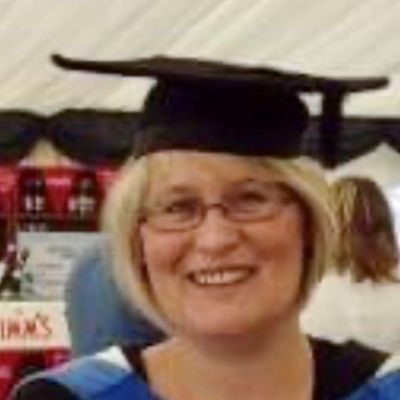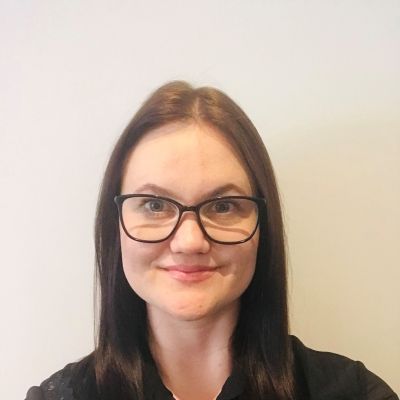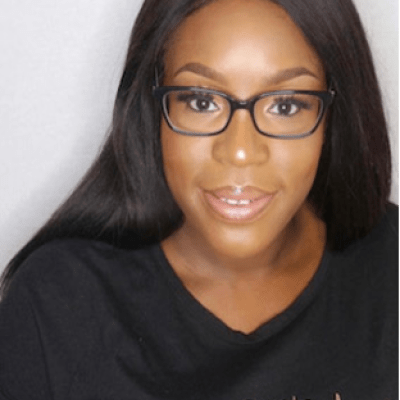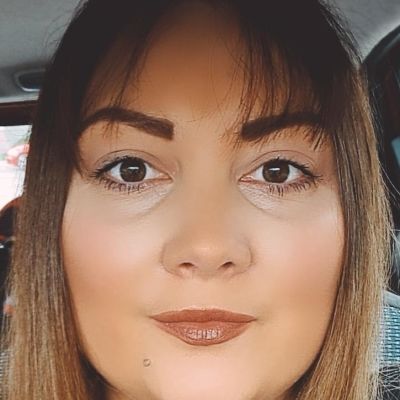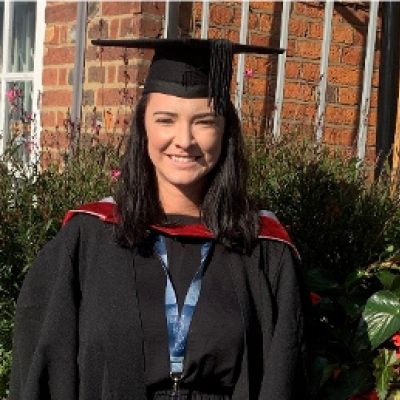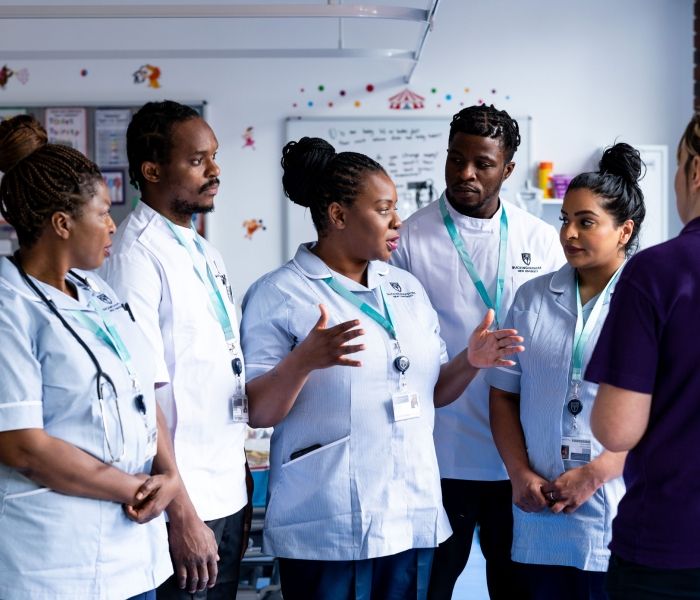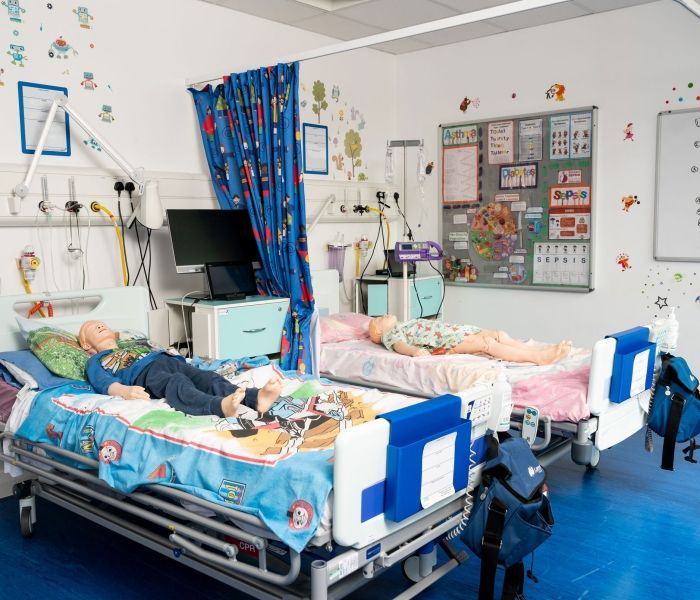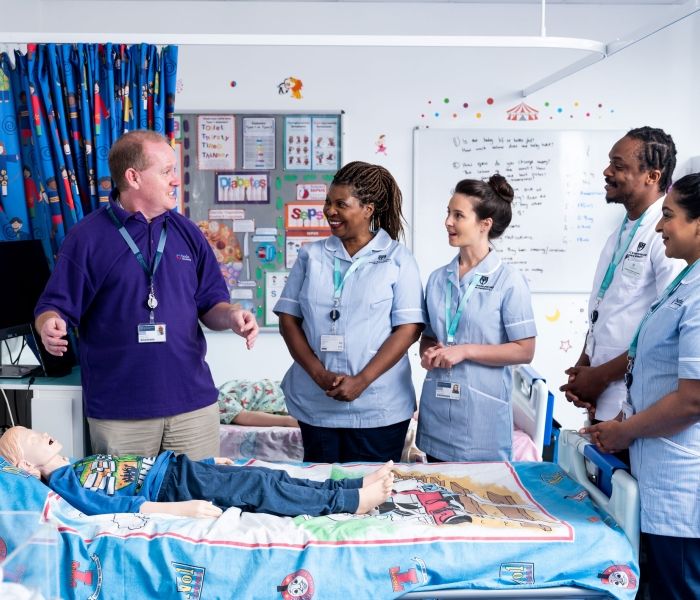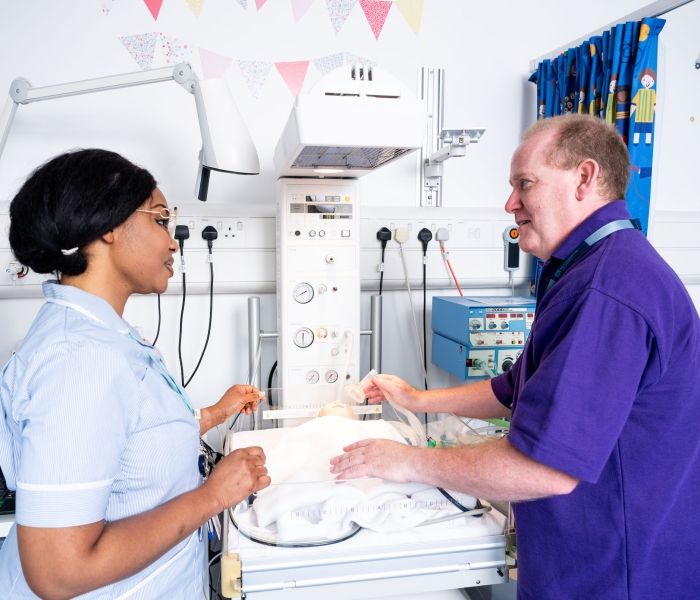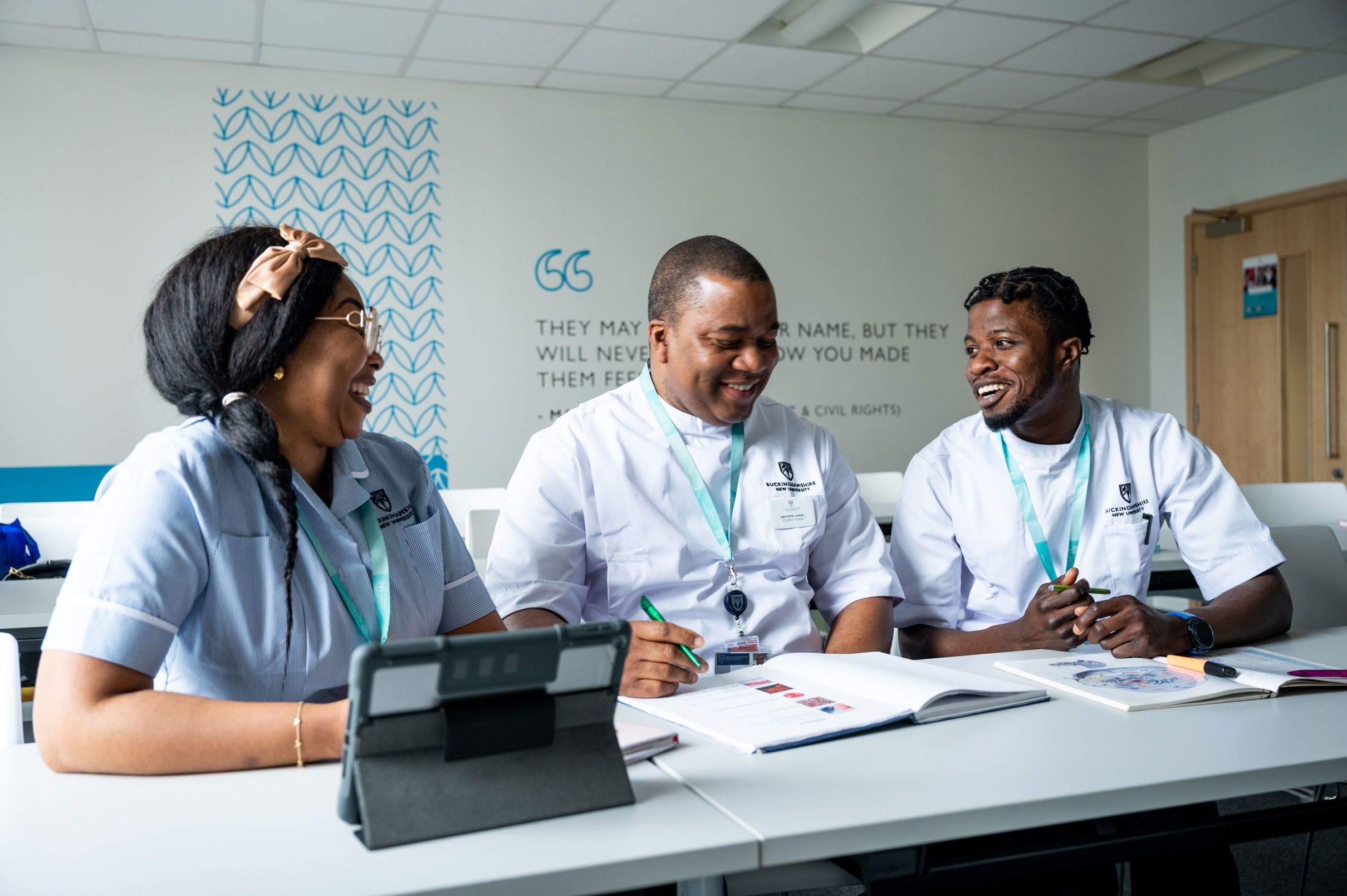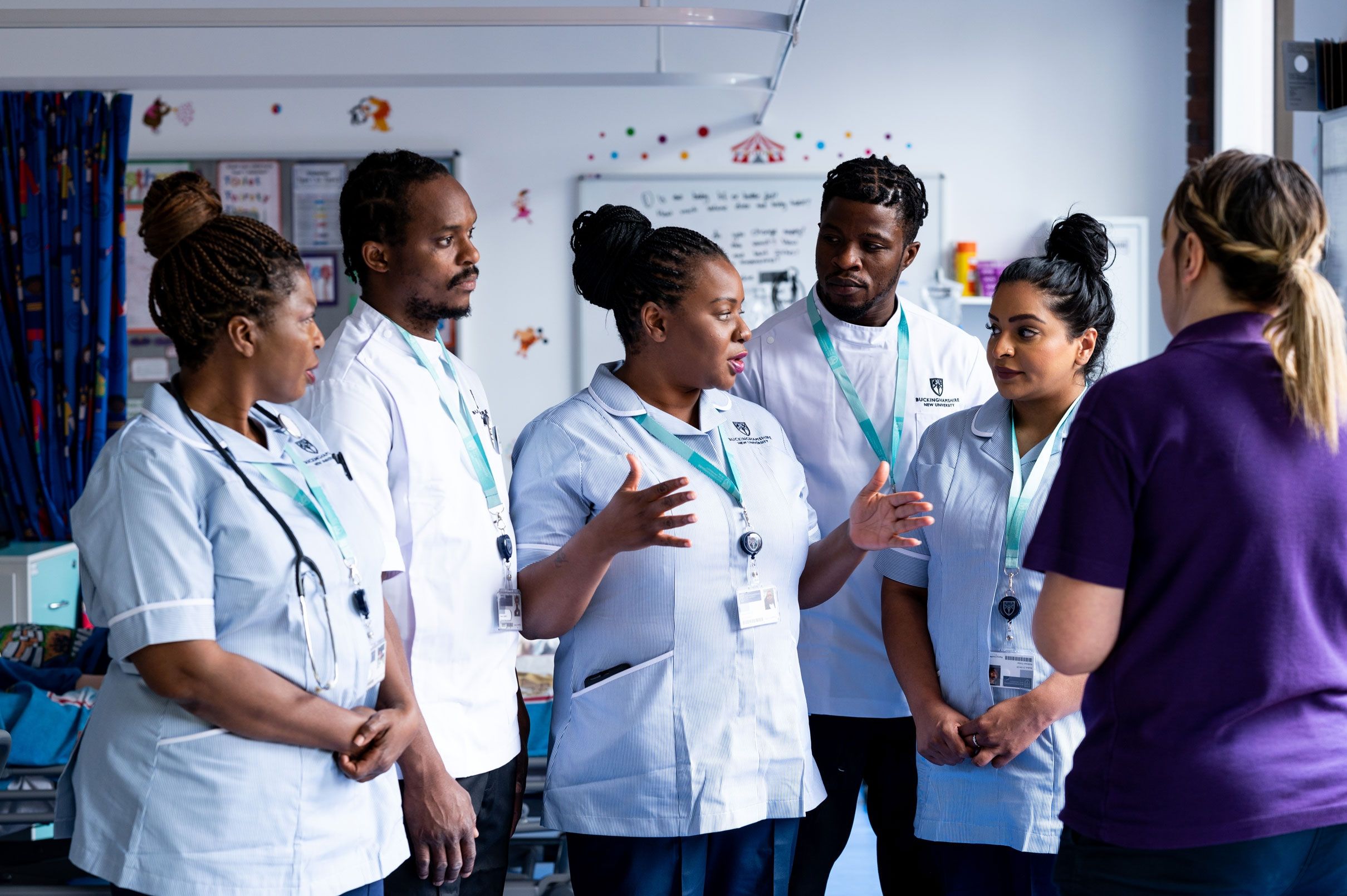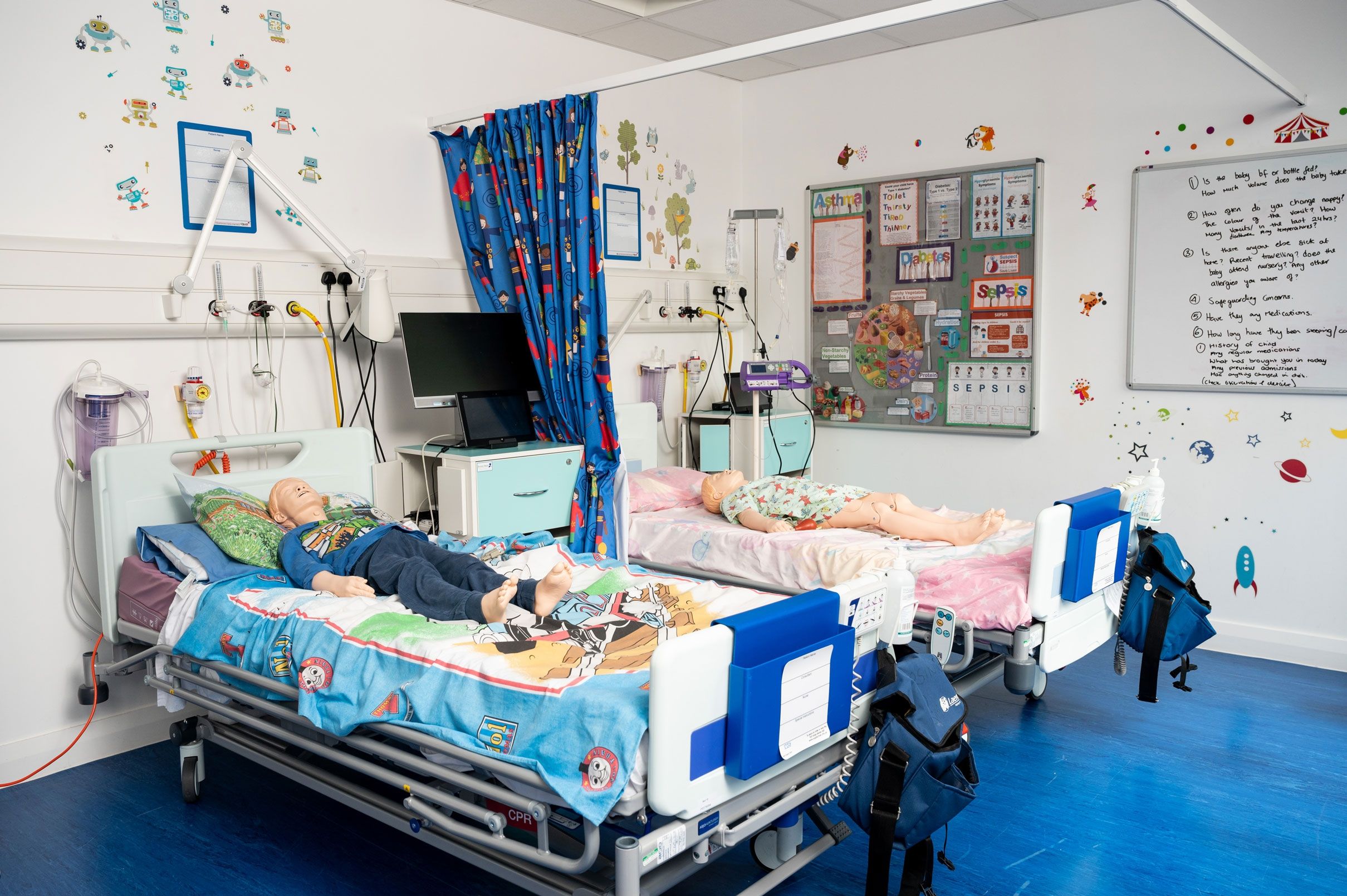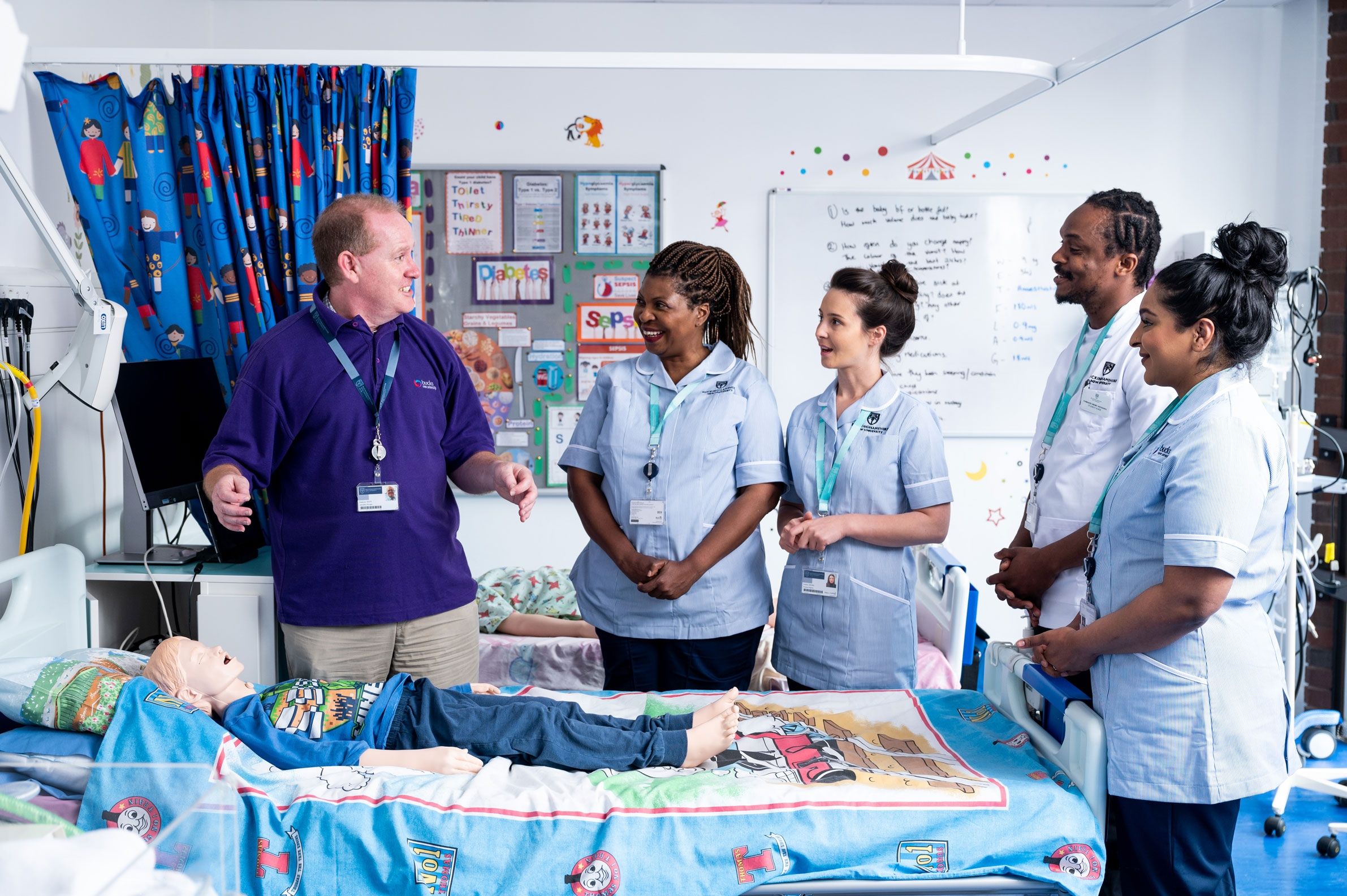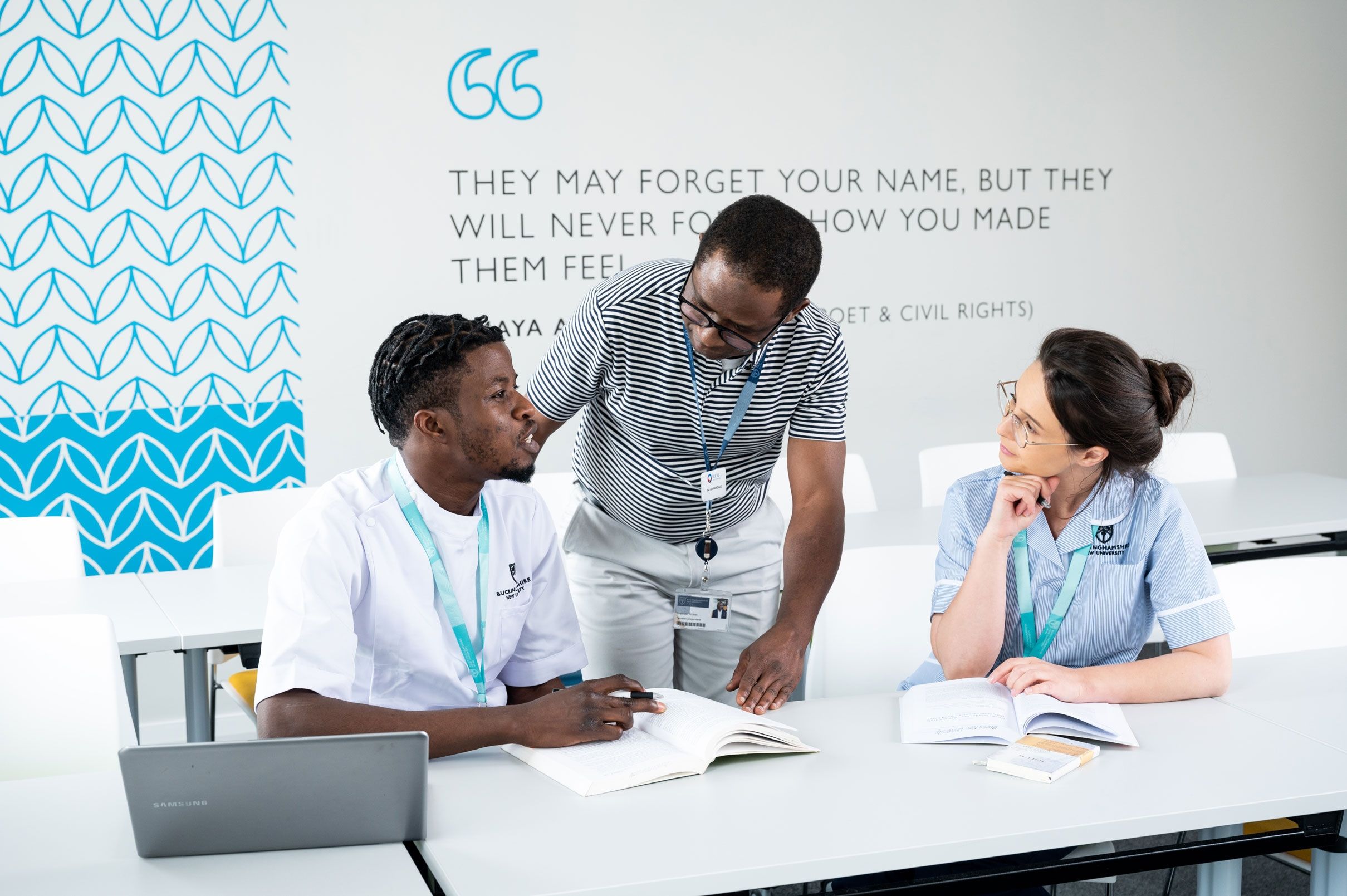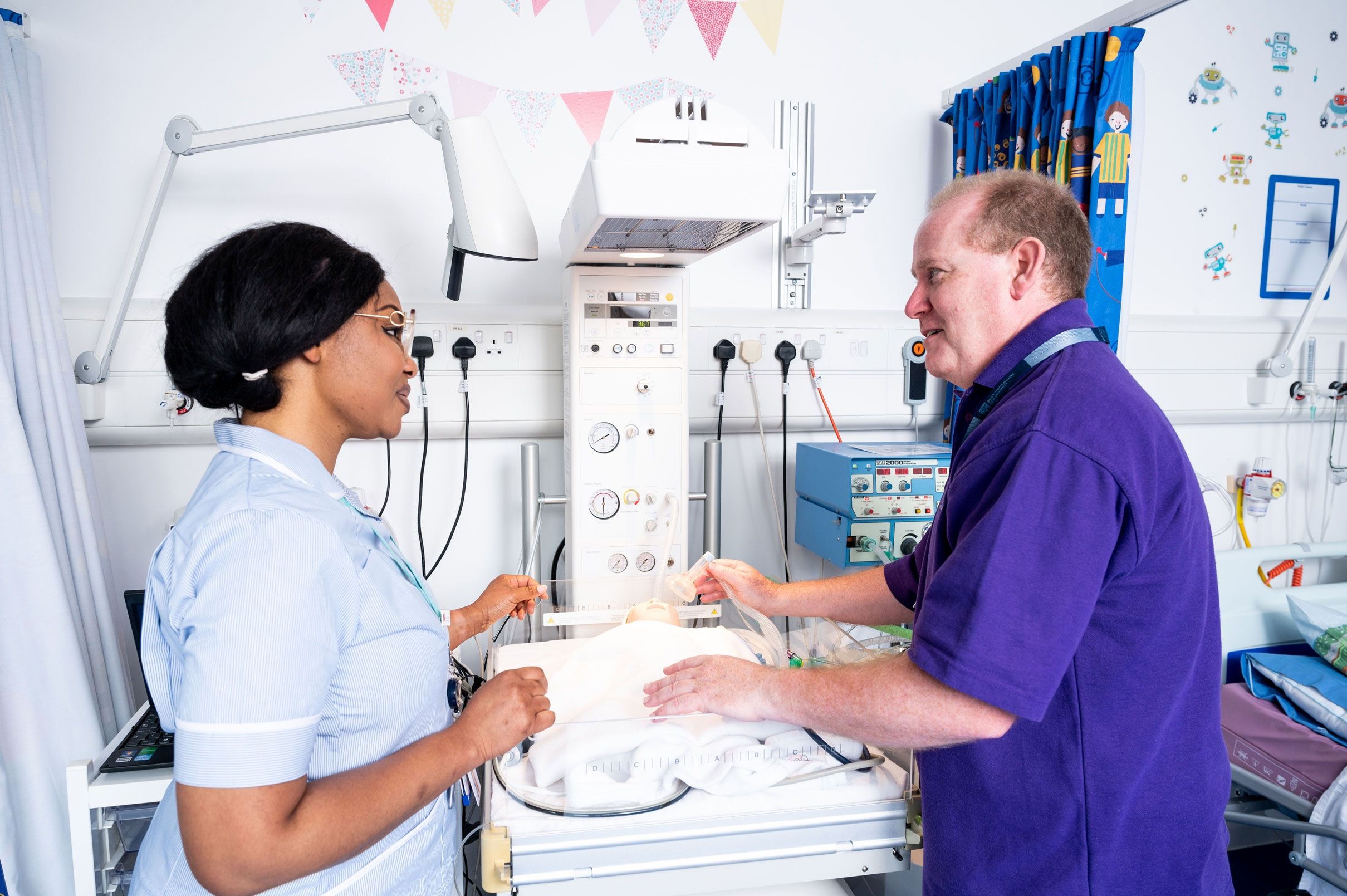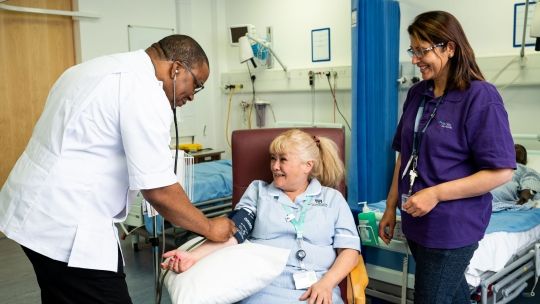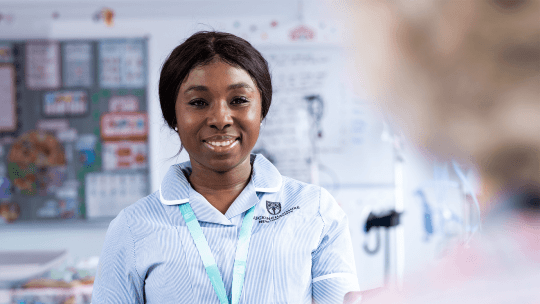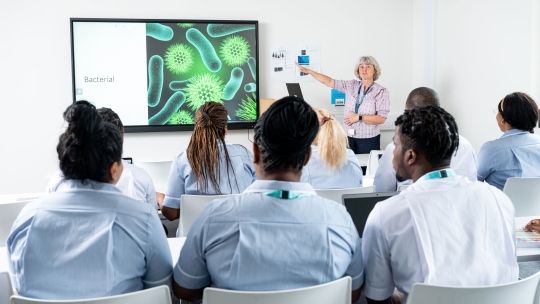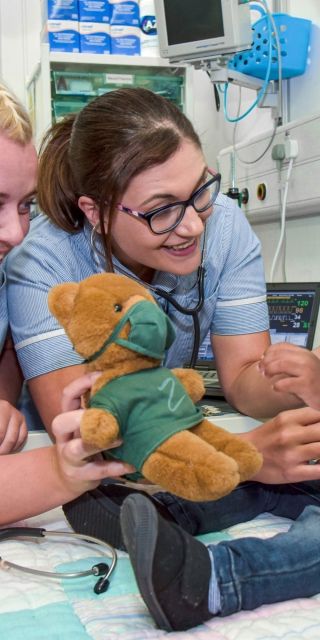
BSc (Hons) Children's Nursing
- Study Mode: Full Time
- Location: Uxbridge / Aylesbury
- Duration: Three Years
- Start Date: September 2024 and January 2025
Children’s nurses care for children from birth to adulthood and support their families to care for them. Children’s Nurses bring a detailed understanding of children and young people’s health and wellbeing, clinical and technical skills and skilled communication to enable families to feel safe in their care. On our BSc (Hons) Children’s Nursing degree you'll learn the skills you need to be able to join a dedicated team committed to delivering exceptional child and family-centred care, whilst being a pillar of support.
Our children’s nursing degree programme integrates academic study alongside practice-based learning. It is underpinned by a strong collaboration between the University, service users (experts by experience) and our NHS practice partners, in response to both Nursing & Midwifery Council policy and regulatory developments.
On successful completion of the course, you’ll be eligible to apply for your NMC registration, meaning you’ll then be able to practice as a qualified nurse.
During your time on the BSc Children’s Nursing degree, you’ll have the opportunity to go on placement in a range of our linked trusts and hospitals, including:
- Buckinghamshire Healthcare Trust
- Frimley Health NHS Foundation Trust
- Central and North West London NHS Foundation Trust
- Imperial College Healthcare NHS Trust
- London North West University Healthcare NHS Trust
- The Hillingdon Hospitals NHS Foundation Trust
- Chelsea and Westminster Hospital NHS Foundation Trust
Throughout the course, you’ll allocate approximately half of your time to clinical practice and the remaining half to University-based learning. Our strong partnerships with various NHS Trusts and independent care providers in the region ensure that students have diverse and enriching clinical placements. Many of our students are employed by the Trust that they worked with during their time at the University.
Whilst children’s nursing is a rewarding career, we also understand studying children’s nursing at university can be challenging at times. Throughout your time on the course you’ll gain direct support both in the classroom and on placement, as we provide a link-lecturer for every placement to support students in practice.
On campus you can find further support in the form of our Student Wellbeing Centre and our Student Learning Achievement Centre. Here we will be able to help you with a range of areas such as academic writing and building your CV.
To support your studies, the UK Government are continuing to provide nursing students with a payment of at least £5,000 a year which will not need to be paid back. Find out more about the NHS Learning Support Fund and the eligibility criteria.
At our three campuses, we have impressive facilities with state-of-the-art equipment. You’ll get to recreate real scenarios so when you’re out on placement you’ll be confident in your Children's nursing skills.
Our facilities offer a high-fidelity environment, which includes the use of NHS approved consumables, genuine functioning equipment and technology enhanced manikins. The essential element of de-brief in simulation is undisputed; audio/visual technology is available and widely used by the teaching teams to enhance feedback to learners.
You will also benefit from up-to-date PROMPT advanced models where you’ll practice resuscitation using authentic equipment. All the technology and equipment supplied to you enables you to become familiar with kit and techniques used within the local hospital trusts.
What will I study?
Becoming a children’s nurse is an extremely rewarding yet challenging career. You’ll have experiences from neonatal units to general children’s wards, children’s own homes to paediatric intensive care and everything in between, giving you a rounded view of children and young people’s healthcare and learn the theory and evidence that informs that care.
As a qualified children’s nurse you’ll have the opportunity to grow and take on a range of roles, providing plenty opportunities for career advancement.
During your time on the programme, you'll be working alongside experienced health care professionals who will help you to become a caring, confident, competent and practice-ready children’s nurse.
The programme develops and nurtures you as you gain the skills and knowledge you need to meet and manage the health needs of children, young people and their families.
You’ll learn how to perform a range of nursing skills with proficiency, predicated on contemporary knowledge and the understanding of best practice. You’ll also learn how to practice in a non- judgemental and anti-discriminatory way, prioritising the needs of children, young people and their families, respecting their choices and individual wishes and promoting health.
As well as this you’ll be taught how to assess and review mental, physical, cognitive, behavioural, spiritual and social needs to identify the priorities and requirements for evidence-based nursing interventions and support.
From understanding and being able to refer to policies and procedures, to pharmacology, treating, assessing and making the right care-decisions for a young patient, you’ll learn how to work within a team as critically reflective, resilient practitioners, with an ability to learn from experience and solve problems.
Our team of experienced and dedicated lecturers have a collective wealth of knowledge from working in a range of children and young people’s healthcare and clinical environments across the NHS and private sector.
Upon successful graduation you’ll be a compassionate, proficient, confident, and digitally able children’s nurse, who is able to adopt a child and family centred approach, working autonomously and accountably, within the integrated care system.
I benefitted because nearly all our lecturers were nurses. I thought it would only be a few, but it was great having nearly all of our lectures being delivered by nurses who had been there and done it. It was a great help and support throughout my degree.Joe Rouse

How will I be taught and assessed?
Our children’s nursing course seamlessly blends academic and practical learning, fostering collaboration between the University and practice partners. Embracing a student-centred philosophy, the course enables you to gain essential knowledge, skills, and professional values necessary for the delivery of compassionate, safe, and effective nursing care.
Throughout the children’s nursing course, you’ll spend half of your time in clinical practice and the remaining half to University-based learning. Our strong partnerships with various NHS Trusts and independent care providers in the region ensure that students have diverse and enriching clinical placements.
When you’re on campus, your academic study will be undertaken through varying modalities including seminars, lectures, simulation and virtual learning.
We include assessments which reflect real life nursing practices and, across the three years, you will be assessed through a number of means, such as:
- reflective assignments
- presentations
- exams
- academic poster development
- assignments
- literature review
- oral exams.
You are also required to complete the knowledge skills and behaviours included in the Practice Assessment Document in each year of practice.
We owe a debt of gratitude to BNU. They have played a critical role in forming our thinking, enhancing our perspectives, and inspiring a passion for learning.Luulita Nuur
What are the course entry requirements?
A typical offer will require a UCAS tariff score of: 112 - 136
UCAS points can be obtained through qualifications such as A levels, T levels, BTEC or an Access to Higher Education course in a relevant subject. Please list all your qualifications on the application form as you will be asked to provide copies when we receive your application.
The requirements for this course are equivalent to:
- A level grades at BBC or above
- BTEC Level 3 Extended Diploma at DMM
- International Baccalaureate at 30 points
- FETAC / QQI 5 Distinctions in health care-related subjects
- Access to HE Diploma in Nursing qualification (Minimum 60 credits overall with 12 Merits and 30 Distinctions at Level 3 and 15 Credits at Level 2 at Pass)
- T levels: Minimum Merit overall in Health pathway subject (Health, Healthcare Science, Midwifery and Science)
You will also need 5 GCSE’s including Maths, English and Science at grade 4/C or above or equivalent.
All applicants should be able to demonstrate evidence of academic study within the last five years and Health Care experience is an advantage but not essential.
English language requirements
For those whose first language is not English, there is a requirement to demonstrate proficiency in written and spoken English through application and interview. An IELTS score of 6.5 overall with no section below 6.0 or an equivalent is also required. Find out more on our general entry requirements page.
Interviews
As well as meeting the stated academic requirements, shortlisted applicants will be required to attend an online interview (Subject to current Government Guidelines) as part of the selection process to ensure that your values match those of the NHS Constitution.
All offers are subject to Academic, satisfactory Occupational Health and enhanced Disclosure and Barring Service (DBS).
Accreditation of Prior Learning (APL)
Accreditation of Prior Learning (APL) is an opportunity for prospective students to gain credits for their previous study. It avoids you having to duplicate your previous learning, whilst ensuring students have attained the learning outcomes appropriate to their awards.
You might be considered for APL if you have successfully completed any of the following programme in the last 5 years. Please refer to our Credit Accumulation pages for further guidance.
- FDSc Nursing Associate with NMC Accreditation (Apprenticeship or UCAS entry route)
- FDSc Assistant Practitioner (Apprenticeship or Direct entry route)
Modules
This provides a guide of the modules that make up your course. You can find more information about how your course is structured on our Academic Advice section.
What are the tuition fees
Home
-
Home, Academic Year 2024 - 2025: £9,250 per year
International
-
Overseas/International, Academic Year 2024 - 2025: £15,150 per year
NHS Learning Support Fund
To support your studies, the UK Government are continuing to provide adult nursing students with a payment of at least £5,000 a year which will not need to be paid back. Find out more about the NHS Learning Support Fund and the eligibility criteria.
BNU provided careers support as well as open days for nurses to meet various trusts and engage in professional discussion. Throughout the nursing degree we were expected to complete 2300 hours of clinical practice within NHS trusts. While completing clinical practice I found that I very much enjoyed working in A&E and luckily enough they were looking for newly-qualified staff. I was encouraged and supported by lecturers to apply for these roles and how to prepare for nursing interviews.Michelle Ginnane
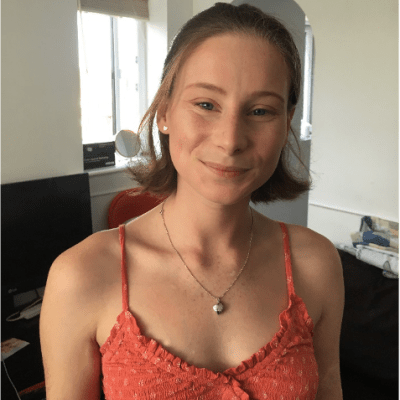
What are my career prospects?
On successful completion of the programme, you will be eligible to register as a Registered Children’s Nurse with the Nursing & Midwifery Council. With this qualification, you may find employment within the NHS or with private healthcare providers.
Opportunities for children’s nurses are continually expanding and you'll have the chance to go into many areas, for example as a:
- staff nurse working in a children’s ward
- staff nurse in a specialist children’s hospital
- in the community caring for children with acute or long term health conditions
- in a children’s hospice
- in Accident and Emergency
- in children’s mental health services
- Supporting health in schools and residential settings
and with further education, as a school nurse, health visitor, or nurse researcher.
Course leader
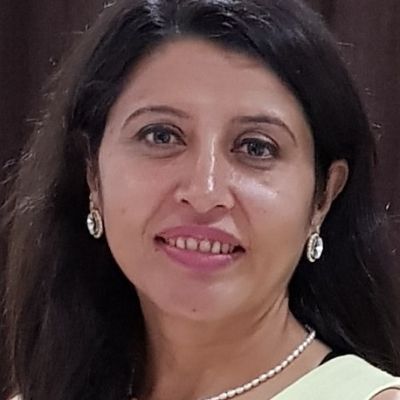
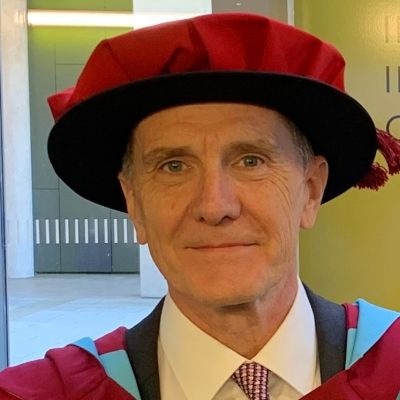
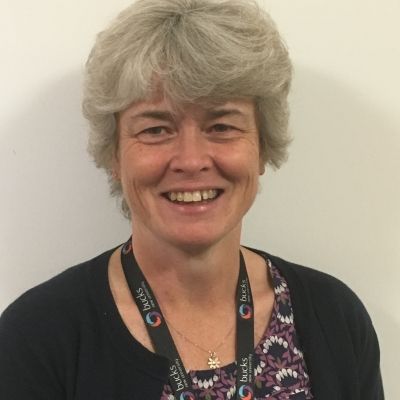

- Associate Professor – Education: Quality Assurance and Enhancement
